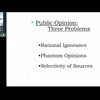partival
Restricted completion of sparse partial Latin squares.
Combinatorics, Probability and Computing, 1-21. doi:10.1017/S096354831800055X, Cambridge University Press. Abstract An n × n partial Latin square P is called α-dense if each row and column has at most αnnon-emp times in . An × array where each cell contains a subset of {1,…, } is a (, ) -array if each symbol occurs at most times in each row and column and each cell contains a set of size at most . Combining the notions of completing partial Latin squares and avoiding arrays, we prove that there are constants , > 0 such that, for every positive integer , if is an -dense × partial Latin square, is an × -array, and no cell of contains a symbol that appears in the corresponding cell of , then there is a completion of that avoids ; that is, there is a Latin square that agrees with on every non-empty cell of , and, for each , satisfying 1 ≤ , ≤ , the symbol in position (, ) in does not appear in the corresponding cell of .
Criminal organizing applying the theory of partial organization to four cases of organized crime.
Trends in Organized Crime, pp 1–28, doi:10.1007/s12117-017-9315-6. Abstract We explore how the idea of partial organization can provide insights in the study of organized crime. Studying criminal organi

James Fishkin: Is Deliberation an Antidote to Extreme Partisan Polarization?
James Fishkin: Is Deliberation an Antidote to Extreme Partisan Polarization? Reflections on “America in One Room” This talk is positioned at the intersectionof two literatures: partisan polarizatio
Knowing the Game: Motivations and Skills Among Partisan Policy Professionals
"Knowing the Game: Motivations and Skills Among Partisan Policy Professionals", Journal of professions and organizations, Advance Access published September 21, 2016, doi: 10.1093/jpo/jow008 Abstract This
Edge Precoloring Extension of Hypercubes
Journal of Graph Theory Abstract We consider the problem of extending partial edge colorings of hypercubes. In particular, we obtain an analogue of the positive solution to the famous Evans' conjecture
James Fishkin: Is Deliberation an Antidote to Extreme Partisan Polarization? Reflections on “America in One Room”
AbstractIs Deliberation an Antidote to Extreme Partisan Polarization? Reflections on “America in One Room” Register here to join the seminar This talk is positioned at the intersectionof two literatures
New Arguments for a pure lottery in Research Funding: A Sketch for a Future Science Policy Without Time-Consuming Grant Competitions
Minerva, vol. 62 Abstract A critical debate has blossomed within the field of research policy, science and technology studies, and philosophy of science regarding the possible benefits and limitations opure lottery
How to Feel About Climate Change? An Analysis of the Normativity of Climate Emotions
International Journal of Philosophical Studies, Vol. 30, Issue 3: Ethics and the Emotions Abstract Climate change evokes different emotions in people. Recently, climate emotions have become a matter of normativization of climate emotionsaffective dilemmas
How is 'Organized Crime' Organized?
I Organization outside Organizations, red. Göran Ahrne. Cambridge Core. The book explores how various social settings are partially organized even when they do not form part of a formal organization. It
Conservative Opposition to Climate Policy May be Partially Threat-Based: A Test and Critique of the Integrated Threat Model of Climate Attitudes
Journal of Applied Social Psychology Abstract One explanation for the link between political conservatism and rejection of the science and solutions of climate change is based on perceived threats. Yet,NNN








